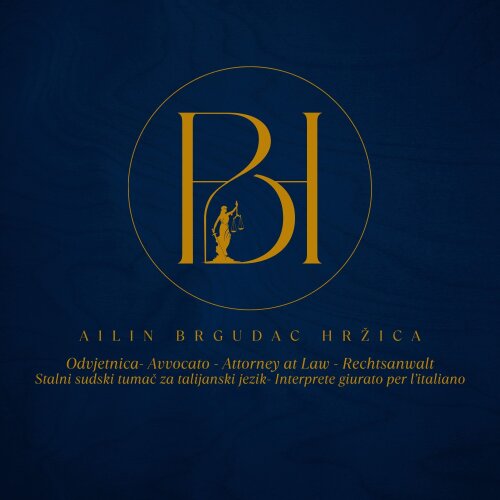Best Tax Lawyers in Croatia
Share your needs with us, get contacted by law firms.
Free. Takes 2 min.
Or refine your search by selecting a city:
List of the best lawyers in Croatia
About Tax Law in Croatia
Tax law in Croatia is governed by a combination of local legislation and regulations imposed by the European Union. The Croatian Tax Administration is the primary authority overseeing the implementation and enforcement of tax laws. Its responsibilities include the collection of taxes, enforcement of tax compliance, and provision of taxpayer services. Croatia's tax system includes various forms of taxes such as income tax, corporate tax, value-added tax (VAT), and property tax, each with its own set of rules and obligations.
Why You May Need a Lawyer
There are several circumstances under which individuals or businesses might require legal assistance in tax matters in Croatia. These include:
- Complex Tax Issues: Navigating the complexities of Croatian tax laws for businesses, especially those dealing with cross-border transactions.
- Tax Disputes: Resolving disputes with the tax authorities regarding assessments or audits.
- Tax Planning: Structuring financial affairs to optimize tax obligations legally and efficiently.
- Compliance and Reporting: Ensuring compliance with tax filing deadlines and proper documentation.
- Inheritance and Gift Taxes: Managing tax liabilities related to estate planning and asset transfers.
Local Laws Overview
The Croatian tax system is defined by several key legal frameworks:
- Income Tax Act: Governs the taxation of individual income, including salaries, dividends, and capital gains.
- Corporate Profit Tax Act: Regulates the taxation on profits for corporations, partnerships, and other entities.
- Value-Added Tax Act: Details VAT applicable to most goods and services, with standard and reduced rates.
- Real Estate Tax Act: Covers taxes levied on real estate transactions and ownership.
- Tax Administration Act: Establishes procedures for the administration of tax laws and outlines taxpayers' rights and obligations.
Frequently Asked Questions
What is the standard VAT rate in Croatia?
The standard VAT rate in Croatia is 25%. There are reduced rates of 13% and 5% which apply to certain goods and services.
How is corporate income taxed in Croatia?
Corporate income is taxed at a rate of 18%, although smaller businesses can qualify for a reduced rate of 10% if their annual revenue is below HRK 3 million.
When are individual income taxes due in Croatia?
Individual income taxes are generally due by the end of February for the previous tax year.
Can foreign residents be liable for Croatian taxes?
Yes, foreign residents may be liable for taxes in Croatia if they receive income from Croatian sources or own property within the country.
How are capital gains taxed in Croatia?
Capital gains, such as from the sale of property or securities, are typically taxed at a rate of 10%, with certain exemptions and conditions.
What obligations do self-employed individuals have in Croatia?
Self-employed individuals must register for tax purposes, submit tax returns, and pay social contributions in addition to income tax.
What are the penalties for late tax payments?
Late tax payments can lead to interest charges on overdue amounts and potential penalties calculated as a percentage of the unpaid taxes.
How is inheritance taxed in Croatia?
Inheritance tax is not imposed on immediate family, but other beneficiaries may incur taxes at a rate of 5% on the inherited value.
Are there any tax incentives for businesses in Croatia?
Certain tax incentives exist for industries such as technology and green energy, and for companies investing in economically challenged regions.
What documentation is required for tax audits?
Documents related to income, expenditures, property, and previous tax returns should be maintained and provided during audits.
Additional Resources
For further assistance, consider reaching out to the following resources:
- Croatian Tax Administration: The primary body for tax legislation and advice.
- Local Chambers of Commerce: Offer guidance and update businesses on tax obligations.
- Tax Consultants and Advisors: Professional services to help navigate complex tax laws.
- Legal Aid Services: Support for individuals unable to afford private legal assistance.
Next Steps
If you require legal assistance regarding tax issues in Croatia, consider the following steps:
- Consult with a professional tax advisor or lawyer specializing in Croatian tax law.
- Gather all relevant documentation pertinent to your tax case or query.
- Schedule a meeting with the Croatian Tax Administration for direct inquiries.
- Stay informed on current tax laws and compliance requirements to prevent future issues.
Lawzana helps you find the best lawyers and law firms in Croatia through a curated and pre-screened list of qualified legal professionals. Our platform offers rankings and detailed profiles of attorneys and law firms, allowing you to compare based on practice areas, including Tax, experience, and client feedback.
Each profile includes a description of the firm's areas of practice, client reviews, team members and partners, year of establishment, spoken languages, office locations, contact information, social media presence, and any published articles or resources. Most firms on our platform speak English and are experienced in both local and international legal matters.
Get a quote from top-rated law firms in Croatia — quickly, securely, and without unnecessary hassle.
Disclaimer:
The information provided on this page is for general informational purposes only and does not constitute legal advice. While we strive to ensure the accuracy and relevance of the content, legal information may change over time, and interpretations of the law can vary. You should always consult with a qualified legal professional for advice specific to your situation.
We disclaim all liability for actions taken or not taken based on the content of this page. If you believe any information is incorrect or outdated, please contact us, and we will review and update it where appropriate.
Browse tax law firms by city in Croatia
Refine your search by selecting a city.

















